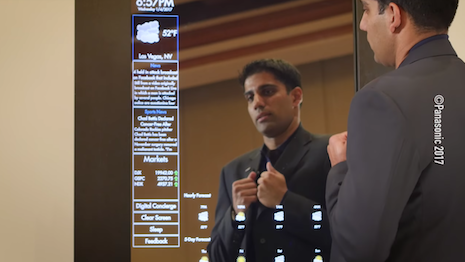As digital experiences become more advanced, consumers expect more and are now willing to exchange data for a better experience, according to a new report from Accenture Strategy.
Accenture Strategy's latest report shows that 37 percent of consumers in the United States will allow companies to mine their data in exchange for a rewarding experience or finances. The “Painting the Digital Future of Retail and Consumer Goods Companies” report also showed 37 percent would subscribe to lists that will consistently provide cheapest pricing.
"This is the golden age of retail for consumers – and there are also a wealth of new opportunities for retailers," said Chris Donnelly, senior managing director and global retail lead at Accenture Strategy. "Technological innovation can give consumers the simplicity, convenience and personalization they demand while also allowing companies to unlock trillions of dollars in value through new shopping experiences.
"These include 'surprise me' subscriptions such as Stitch Fix, where an expert personally selects items customers might like based on prior purchases, and sensor technologies that can detect when a product is running low and automatically deliver it," she said. "Companies that create these types of experiences will thrive into the future."
Digital and consumers
Per the report, consumer packaged goods brands and retailers who focus on transforming and innovating the digital experience can bring in $2.95 trillion in industry revenue.

Panasonic and IBM's AI mirror
Consumers are looking for intuitive experiences through technology. For example, 26 percent of consumers would prefer sensor-based tech that would preemptively addressed their needs without needing to interact with personnel.
Around the world, 63 percent of consumers are interested in home sensors that will automatically order CPG products when needed.

Even malls are embracing digital
Artificial intelligence and the Internet of Things will be major drivers for brands and retailers in the future.
Additional insight
Personal luxury goods are the most attractive sector for mergers and acquisitions, according to Deloitte.
Deloitte’s head of merger and acquisition advisory, speaking during the “Investment and Private Equity in the Fashion & Luxury World” session at FT’s Business of Luxury Summit May 16, shared new findings on M&A trends between 2015 and 2016, and looking forward to 2018. Forecasting the investment habits of luxury conglomerates and private equity underscores the health of the market (see more).
Watchmakers’ ecommerce and digital hesitations have given way to the rise of gray market sellers, which has caused declines in watch brands’ sales and profitability, according to a new report by L2.
L2’s Insight Report “Gray Market: Assessing Online Risk for the Luxury Watch Market,” explores the impact of the gray market on luxury watchmakers and how watch brands should counter the rise of this category of sellers. L2 describes a gray market seller as an online point of sale that sells legal, non-counterfeit products, commonly sourced from overflow stocks, via an unauthorized distribution channel often with discounted prices and savvy digital practices to court consumers (see more).
"More than a third (37 percent) of U.S. consumers would allow companies to collect their personal data via intelligent devices in return for a better experience or financial reward. Another 26 percent of consumers would use sensor-based digital services that preemptively address their needs without human intervention, such as automatic delivery for basic items like detergent," Mr. Donnolley said. "These trends reveal a major opportunity for retailers to use technology to their advantage – by embracing disruptive technologies and using digital to gain deeper insights into customers, companies can deliver differentiated, profitable experiences.
"The success of companies to unlock value will depend on their ability to adopt innovative, digitally-driven business models that provide customers with the convenient and customized experiences they crave."
{"ct":"3CJ1y2OIJkilqzG7zc4lqD3seWfIAl+qP6J5cj+gE2PZ8VfEChTu9MVNA3UpycovozfRerPh\/rDaY+RcyMI4wPRKE386mJSVSVe2vpfrdMBvuw+7kPwWCyXKN8fDn+S2dJgXIB+mNxcHDkF26L566RoG0Y6wQKx+8QaGmfUovR097XfeDY30lxBJpyWZaF0ussInduJ5WXBc\/fGwMAemZmxxPHPr63Rs0Y4tHrJUOg5ty9\/lYJMBAl9KDFAbEH06JRupzL\/lmF31VaeYmxeyNprKThge9ECZ5dsuXZJkoNqF28Fah9FejNQtae7c9YHJY8IM+Z5SFDRW16CdFpDjbQS+YiT9vVnqUa67IeJSNjFeyKjZigroaS5M4sMS4CHNbrlJBz3q6gFa57WntsFmnpr+efLBjTWkpJhzY6damHESNWIuNroe4N8kiY1TzP\/C6beR\/asIvRMfkPMYpzJvaooI3k+YdjxCfjSsQBkmDFj0l44Q1RYaG4v98EdHjbd8Sgz6KqURivIoUcbDebdfQYN6nmgbneG8iFLGeeltIpF1HMX4RdjImPEyE4vVd2AYbEPbtsu+XTF7JFXu8GDhYBjtnWuN03M78jPAMRPGw7auLDCv9xlr3Sn0wYT9Na7lwVnce3BJq6GxYXddOAn8H3FSpUD14Z6AFwBzTjwilXyo80MYhOhbMePEdVWD9E\/H0DcDnB0fPZEmqZQXWv1Tb02W33NilnPfNWaai3pB\/UW67xcPfeAioWK3ly39mRP1Iu585d9Cm3YToSCtHBSZRw0jHsbLp6p2eJagcbqowQNdbdvDUaLga2ZBEnsNYfVKvecBjz2NVqn788xUh+SHGX5x+fuDrnQ8iu1Nw7fwWO6WeAMP6mYHaJ8nOnHjXzKklef1sElANc\/L\/j\/IcHtdQq\/YxsuT5n6I8uus9erqSNhHN8zWwiHRPdUMtt\/tKXIJQ1mSsZYjS2LzAbuT5QaGjv8vMP0dydhtdtIeaeX2Qb\/qbO6TqyCzUzgOhZQBgOEhB2lS6EJB4vck8vABjWA29fdulTUGCHbIc9gUeayqcWzq0UiGoH94KHgSAPpSTFg7+7sITDSBK+sia6nDhW5Op+foQPv6a8gNuJdcTv5DzhpjgwQL3lYhgKPAKNouOfSwOhyNGQ6gvODDvkyCyQJJhWrMsv7gf7SsNrqmgZ977UHMKjkGyAAWiGqxU\/TcaYU+R2wpxLL3N0DVJAW5+NM33bFxSjRT5YSjObcoaQGrpa3kP7IS5dHwwyNh\/gNzwmdcbMWRH4Gt5szjBqYdgi9TRxiy5ruM+Umcl+FqUacW7lYwFkT6v+a\/zTw0okG9wBTIkGCQWLiQ\/IFjYmLvCcpv3G\/I557gegGIsI4z9bRY\/fSzfvaX1DsNgEQR7MzCqqKOaakQ4\/ndl+ztIPwDPEhIRqybh87KVjiwKolQX5JGKv0aRwS45hUowBh\/IZNqczosqO\/DIm6Ps3b4ub5RkLA06hMhImmFBN9P8AkzjKhh0600QAH2JQv+CEIqGMMAmXV+5nTkYCxzDnHNZKpr2+xm3LdzzJqf9ngCU7+0qGv2b05n3pQ5YJj1dMrcwHjzKHERq61UqcWfc7ZG4frSNLeaGRsQFK4djf1xmLWT7J7FaSLwHRmz8NYnYL+tqjC6\/CaLCRdQGCEsbTlYQI+m0KchmRnOkE7xD6jqdn975qVdEj6JJBe1HBQKTRBwJ3qyrjm8vhwEDMifoDgmpwHCFi72geHc5v5V\/LJnBZn6pACaO4Hk1M60ppbIIxlQ0hKwQgVzUgRIvScddH5mNLP4WMMZVk6X2yxzNF8X\/lV1M1C4l4ehnectcv9U093Bz0VjfQtnPJcgwylW1gT13u1j7k34jwvoXYyaOVQJfnPuULzMqTlLnGlcAEdBYoMYwHj6tAweFahaEkL86NbxSUlfG3FIivYUDhlOFFX66tB6GTr78NOVFCaA0nyzjP1c3IANQ\/UBJWdub9womZbQ35ssEV2UE3kh+lGqcIwR3xGc6TgjiV6mW8O4ux\/iZfRk4XyohMAo9p0Y0gEc+bfPjoFOzg3KrtpY\/VhY7TDL2aPn7cWFUl997HTSRQuUEzHgwwo6mqZnxZQwN3jZA9opW608ZruZz2l23BQ\/G3YNclot\/K+fQXjoi38N8syNhkUgQ5kBDeIWrRX\/ErlNLDFi0INiSy8IxNuHtktZPi70jynYYIHt+A58Pp1bjQyJAnu5laFB2H22zMVTyiHmmHVMYcfxnsISCCJ3iMBalyxbusQEiApXCaGXGvD7bzyAGvsVG1vR261G23NndipXSdZTdsRQJySYfnK\/Aj+kjYs3p+7aO5XRurpTUpzlrAi05LFcZlAZqIoZWckwpS9rtlh8QbNJmPEO8YlpmgsSIjFVMyXwbcSeZQNsRFTlq2VEg5BrJIGjgvkz2FTU6ocU74XV5MnyJW8JsilHPKdoPSkPgz7bSLJ4HKtmGF+ujbbO\/MqBR6h4sx5BsGIyYdf5IONRmE1hipQNa8VX9kHf1S20T3CCehejBy2rYtVDLrha26zR0xUOS3tHzUAjQyOLict2LUGRqLgRQ0ozgxHI4lj1PpaGj+NwkSmK1e\/Ez8+FGTFrPO0dS82YDLZjIZEykynxS2TAMsZ4vCYDYoccS\/cTgCo8qmL2VvvKpn05KXkFaVOtnD3QqlSJfHEneOGVsmTpPc3lp6+qySZ\/tsejN72xE7vRTWRiIxNx3ymVpuQnZ+Am4Sz6nI7kn+GSXuvDXM\/C9ZEIwIo9raPJGC0BGDQ3sk5ubKVKgFOhalysBYB1jqsny\/RpwXhH5e4cukVhtmiuikn4Qm4M6cMfeW4U0RTeGkSW8k+N8ENv+A0GMmX5YN7pwmHNGCc89GgSaiWsSgpwNYGdFoTYKTffN+lf5VrdVxKuxCUXKoyboq3ZOyaHoF34FkbZgs0i1pbu2OPby8nGStCGbDw0KpSp5PTyZeYxgZXMZiYXphCVM1QB6gGP0B4Wi9hfPJVpAkjy3xpQIbxZ6sMOlmnAt5ADVWENWF4k2N+0EhmGobj5R8raGqM42VpZ\/tpQi9U8WoDcraUhDuXRQsM4hInvUnzaqkMXjj2a4cMCoJfp013JJvtCwKXFYfFLaTZEZOt5AXoc+uPHFyNrGLPQQMoUMraQyR7Y24nIBpnRMNwNKauqp9fm2GphOvPHwo\/KQfZoJBhL40HaKg3BiuSJSWSfgWqt1w+O70x9wjwbvZoPQuWJ4l4PxJwk39zn0GQz7AnJ73l6dQhLcYfPezYjUgPFsTW6ttLm+AGlDo1GGY179FwDUuAaMpc1gPQb0PUgih9T9IuTNJu2cNpF5JP66Dv8XpTti4njLEe8s8THR7AeyVSeZJ+FpKKX8WjBgbvnXUb5tP+AQxkpQbuDhXJg0YpwU6DkFvBbMPpO+EJvkgbv3cr8O\/Nsxzau+WQtxv2KYP3x\/qModVfrQzFySuv8cogT25Ozb\/uJpstnde0NPbKE\/HyAmrlXyXqjSSMCNmGoN2R228wNG4Q\/qOwgPIxaiosl+TNEMkt5LWjXE5kGXQctbEXvwnwA1uQ82\/iN4XOrgb5bXBQ+\/Wufn0sYdv8oHpGVHAdy9se\/nxMJVspTeaVBGyN4cRVoXKq+HLYpeHAiV5Jzs6BTkTjtodO9LvQx75IBQmPxAb7cJ6FaAbZ7N7WGar43tNkdfcvQgaQLmqWE\/2TXdFxn9MAgtSMWWcXGTs3VsLJZ1buBpEU5T2jsXkVIsKOVOI+pzdIXG05sqY3pAN7\/Bbj5A4iMxkD1EClZTKFFjvrF2xUqSERcITCouosXG9uKEI6jBeFP22qGFxEgyEHuWC1X\/9tDs6slMNo4QMPUuYxHOYqsiwP77Czn++9bzF+DO0mPFT31eq7l0O6dRwvISAWwHhWVL4y2\/KK6PPYQRiMlVl4GWVMOoPoje114GlEkvapdHGjfEB+qXMvaPRvRTebG3tpFcfYZdJyLcnD7vpNyp4L8QDrGglbsb0yn+YlHwBCMLsQ4NvoDAAkNxS4acecJPr6BxSof5qpmL2sCXB\/D\/AeoZLHQuJxyVA8CLDF8EX8ykzS7WIMIKpcnHsHvAa6hBZ2MxuO5qde\/ljHKBGvK4Ma7adXKaRwE9O0xfB87hvfPeS44zDFGgdE4WnYjQhyCgP6x3X\/+mwz247ouhTRG2JhQxGV+DCz6dItNCsKtI5cWlmh2SI+aqYedIGwqn6KCBNecgGqBVdQTCV8\/lKoYQVc6C4xKC7n9rUQFOxgBN0OFC1gRhR3LyMO9yA6wqUHpmEWJKOYCw2fH\/oVOPVcIdwtkc083PRCiDTPtC+uQY3e9bw4VpcMPArZYOagaK1I4ITqBYkv8oW1E+7hV3xlXUdOtp5PyrUdnRzixO6clEYAlYipjN+uf1zD95VYav0dLbFjHA4cpa7x2Kb8T+NFUXTkvhZ0sMZwUQZt0Dp8kBORg82rWXzSyZOJ1UehVsCOpjyezh2xLvkKGu76ZVJNYIqTA5p1ZjsSV8MP1wqGKafeCQ9mJX0aSvj+axB72s1eZ1Mb7mr8kQhCsX922vH7FqIKWAkLlbJZsE14zD+\/TF9C7stc4o1p1fx3Le0pWD2RkJo\/yB1dfBOaBb+6dUQndBS4qNozxkhTo8CuAie+00EPyI+GsJfI8kQG3QIo3M5Rlzte1f48oBgJIf8mstfFOGt3Uh6CBT178QEv4CDFfBoCkmQj5ITPqwL5lbqOxFWxBv4N3yq8DcnZd5Vkyj0kjiJtUqFaHZUxxGDTG7jgZIGT45OlxpN2308MpVMpRJZ0WmabPENuJUjxBmstSvNx9SF6zkKrChx1TgWFQ3x0NzusaXBEsL4pfZqPyuMSfoRudhYIFEPYaCIrzTxddj4JXHppb0FF+8lemyL7P+UTb8hkYs9rKoWPNdV+u2qhJyj5ycskcFZBNGj60kwWpl0kk01ryMoskf+L3UuUHVJ4ts8OVlC4l1ZrAAcXItrOXtDvPc5TKhmhyYjHM+0TaMYet3ZtAk4U14MF7pfXrH1uC1hFOuCF7oNbVOXmKK9GpPj0pt1sQbL8FvSV2MFeVThzq9X1kFD2mdSbuzuPu5HH6TLO6JXTuOB+ja2YKHgYh8sprXY1oOXsk83vbWa3YUj0oYnBdcTc6Fc7V5ELQgximd2Dm7J4RaK16vJRJnFaw\/WgaaXFU6\/atfcLRxslLcLZ+JPLMO8CdoUXJDpZ49Aa+oE+5ElGT4RKtlLgeCclfaxNItNk6H5Fpwk5E4NwTu4kee5eSbNVX3EGYEauAzqcR50TGTKvuzn5n65O2XqPAibvaMdBOMlt\/mpe1\/1rK7Tr9c57YFAY5pTBtjVX4adyulwn01MYPd9P2IcN4le3AFMHBVAeDEYFBBnA7zcu9lAooDUmQVhf4pbO1KccgtEEtWy2inJXUz1QL7j6kXu10yb4xt01ydyJ32vhIlRvYPBQgiMhfw2pDGz1rQL\/D2Y94MwDVwa\/QozP0KnfPZ9QD5Uq6qEZrCkCtXiElivC4Nh7DarYnBRbU1FDWHM5Ijp54PCo6ajXFaW700lwkvdCWFFqSx0lDHo3tDCId9Q4c\/eilIoDFs0TTpr76rozyd3tL0UlMHnnr\/79nomDrjtEg0Rhs5updi6DDE3ZB\/InJhDsvdoWVnWOkKuxyP\/IsqzgedBQcNfZWaKNOpTQ+oIM1OQ8m1eXKcFszgPLPY5BQudNEhPayc4pjuXhGY1dXW2OfgpMhBuX7WV2KcYQw3KZCSDkC2aJUlA8BWvayWjcpq2Zi6CVMSNqhbvWyljA+X6XCYEEIBIT0VBL6gFShUEmLYSfUNOg2ptNMvzFCkPPiPCpVtypQCoalKAonKTEU9LhVV4ioTLn3z0KLC2KwaQPypx9Zw6WsEQaLq4zJlA6jRTPhp411IBgkehXpcrUm43FWnUqYHVnsZmJ7hGe7BawQI72wUAsxUIvCXUmW0hRL7kkI\/E0S6xuQuJ7ZBvBK1JbaJ0B0XGtF0PZS\/bYHwQttMxohVe\/qfvCfxlVN8tRGmd2snntUYhjqOpTylYeOA5ndLIw\/w5BtN4UKZUYl10KTnDVvNLWeDkv09twKhYy5Hv6J\/B6hqR3T1O1H8ZEkObLMBoXQu8RxwvMQWg\/5mM81p5PZXDFH55CUAV+5Rz2YLv5R8uuSDapeT4zRsDFws53idsvi8zidR9+sJhv7OKEEZ8wcTKl+kZoTqpfsbmBN0+L\/pN3hQvtdtuHvkS6laXPhyg71\/V1UcxZDiQR2EOpIXiq0Sf7wUetEmB7pIU42gVZ3a8SFV4FpCfWa7v70EK1GWGe1t582KDR41+UTM5r5JcNqIazssz\/HKQyf3HHOCHUoCSs\/m2rF\/tsZ\/0BMM\/oSYDAIKGzj5oBE9aQUNWPOTdy\/XZeo92II96H8B+PKQwI8\/3ZuBlEGt0RBdgY3xRfZKHyeS9DO+I2kTdwUp0ogL5Ik9ElNV5de7lXEtQh\/6squ3zeXoXCgS5wUs89qyrkorn7UpvOGwiaMw71LcN1gyo\/sluIIX9f0emf5EMSJAf7jVa6liGpp6HMxLXxHNssfY3sQV0w83eBMhhDbFgwyX3WaV3RF6Pcqr8bwjmnWwUcGaqz2H23CfpBYHPfirrEvefXU1lkKCUqdLwfEsB+nv04JKcN45f5w0x3KmwhpNiFrh1QVRE1BqfVk7VAYCoEfDgqp7Kxo\/bKXagE7C1athyhS027ZC21YjuUXaXzUZv4184DWW2sE4ITwuIHeFcwUn50z14epsDKXPY6W9vXKPLiz4cUot77\/GEnGqqTUxMWqKowjdOII+3XjoZPdVYBWhzd+15jm8N5dMF7YpH36MZfpA7sv2dqrdhMOn\/41Jv\/NHx32AaHuAlZvgz\/SWd5OkqgQaZXZrZdmeighLhHyAMkwpHdllq9zmPJBdolm\/XXX5i62T3elHh7081ZRBmD\/rLSTniXn70rBZGdRfvmaTx9wLzzMteZxt6tZp9Ye+5iDU9k33aGsBD3hI9BgJ0CzhAQMcsPPjSzxqPF\/G1nJ0nFLhao1qGKy2w+MwU1M3MvuY0buyA1OdFibaQmJl\/w91JgluRv3oBndT2HdCSFNgmYGOqUZ+RgbE60m85wKmx4VPidtj\/X9s2Uuyl1gpAo88t3WSWu5Xww5++I1vWAnxIe6WviVNn6jtyPXCA+cbOKtsDxvFA6khlP5I7bONiajR\/REVPOjJ6zbZe6lRPJa","iv":"6b57c4959f9100c75e06677f8aab69e1","s":"a3ce22f3db7147ce"}

 Digital expeirences matter, image source: Swarovski
Digital expeirences matter, image source: Swarovski